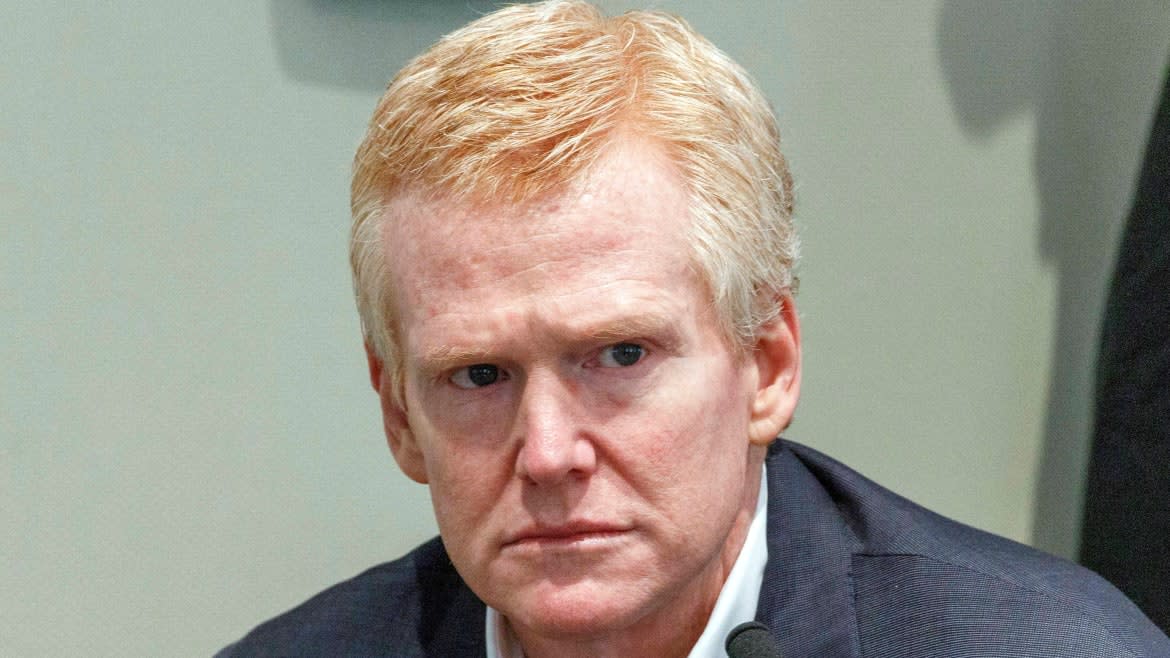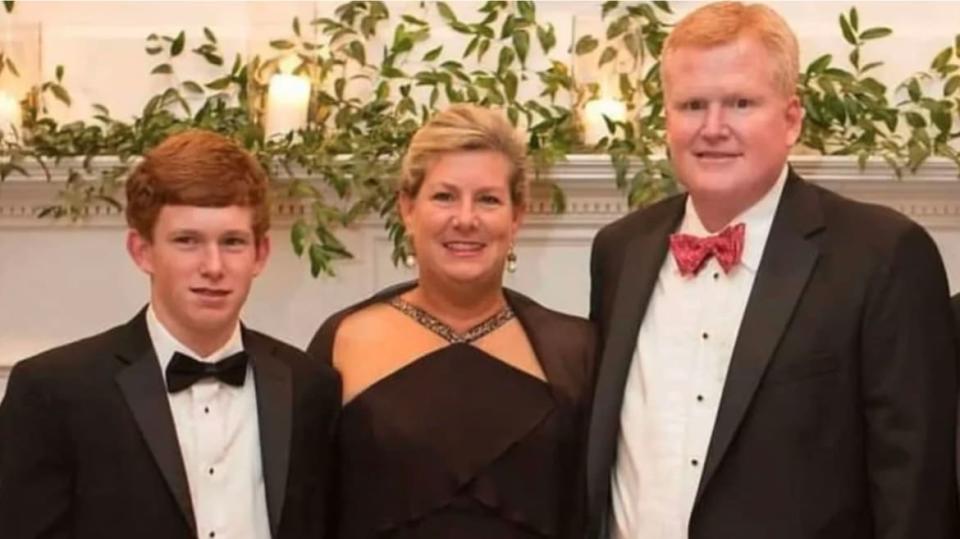Prosecutor Shreds Alex Murdaugh’s ‘Vigilante’ Theory for Double Murders

A prosecutor on Friday grilled disgraced South Carolina lawyer Alex Murdaugh over Murdaugh’s theory it was actually social media vigilantes who gunned down his wife and son in retribution for a fatal boat crash.
Murdaugh, who is accused of shooting 52-year-old Maggie and 22-year-old Paul near the dog kennels of the family’s hunting estate in June 2021, said people were upset after Paul was accused of drunkenly crashing a boat on Feb. 23, 2019, killing 19-year-old Mallory Beach.
“I can tell you that... as I sit here today that I believe that boat wreck is the reason why Paul and Maggie were killed,” he said during his second day on the witness stand.
“I believe when Paul was charged criminally, there were so many leaks, half truths, half reports, half statements, partial information, misrepresentations of Paul that ended up in the media all the time. And when I tell you the social media response that came from that was vile... I believe then, and I believe today, that the wrong person—the wrong person saw and read that.”
Under cross-examination, prosecutors eviscerated that theory—namely because Murdaugh has admitted he was with Paul and Maggie until about 8:45 p.m on June 7—about five minutes before the murders—before he returned to the house and fell asleep. His cellphone recorded movement at around 9:02 p.m., when Murdaugh claims he woke up and left to go check on his ailing mother. He says he returned home to find them both dead.
“So what you’re telling this jury is that it’s a random vigilante... that just happened to know that Paul and Maggie were both at Moselle [the hunting estate] on June 7; that knew that they would be at the kennels alone on June 7, and knew that you would not be there, but only between the times of 8:49 and 9:02?” asked prosecutor Creighton Waters.
Waters continued grilling Murdaugh, asking why a vigilante, or vigilantes, would show up to his rural estate without a weapon or ammunition, and how they were able to escape undetected while Murdaugh was inside the home.
It was one of several tense exchanges between Waters and Murdaugh on Friday. Earlier in the day, Murdaugh reasoned it was the failure of prosecutors that made him withhold a potentially damning detail about his alibi until this week.
After claiming for nearly two years that he’d been asleep for hours in the house when Maggie and Paul were shot near the kennels, Murdaugh admitted for the first time Thursday that he was at the kennels that night, but lied about it to police and prosecutors out of drug-induced paranoia.
It came after prosecutors uncovered bombshell footage, filmed by Paul at the kennels at 8:45 p.m., in which Murdaugh’s voice could be heard in the background.
Waters grilled Murdaugh about his dramatic about-face, drawing visible frustration from Murdaugh, who shot back that he’d concealed that detail for so long because prosecutors refused to meet with him and his legal team about it.
“I didn’t have the opportunity to, Mr. Waters, because you would not respond to my invitations to reach out and tell you about all the things I’d done wrong,” Murdaugh responded when pressed on why he kept such a critical detail a secret until Thursday.
Waters scoffed at the response, insinuating Murdaugh was continually coming up with new lies to counter any damning fact dredged up against him.
“You, like you have done so many times in your life, had to back up and make a new story to fit with the facts of your life,” Waters said. “The second you’re confronted with facts you can’t deny, you immediately come up with a new lie. Isn’t that correct?”
Murdaugh disputed that but conceded that Thursday was the first time he’d publicly confirmed it was his voice in the video, and he was with Maggie and Paul just before they were killed.
Waters pointed out that Murdaugh’s defense attorneys likely didn’t know the full story themselves—pointing to past media interviews in which Murdaugh’s attorney, Jim Griffin, repeated that Murdaugh was asleep on the couch for hours before the alleged murders, not just minutes.
WATCH: Son’s Video Destroys Murdaugh Alibi, Prosecutors Say
Prosecutors allege that Murdaugh, who has pleaded not guilty to all charges, committed the murders in an attempt to hide his financial crimes. He is separately facing upwards of 80 criminal charges related to stealing from his law firm and clients, opioid trafficking, and money laundering.
Murdaugh claimed Thursday that he left the kennels shortly after 8:45 p.m., dozed off on the couch, then got up and went to visit his mother. When he returned home and noticed Paul and Maggie weren’t there, he went down to the kennels and found them dead, he testified.
However, Waters walked through cellphone and vehicle records on Friday in an attempt to highlight other inconsistencies in Murdaugh’s account.
Data showed Paul and Maggie’s phones were unlocked for the final time at 8:49 p.m. Murdaugh left home at 9:07 p.m., he said, with phone records showing he texted Maggie a minute later, “Going to check on Em be rite back.”
Waters said Murdaugh’s phone was inactive for about an hour up until 9:02 p.m., when it recorded 283 steps within four minutes as well as “numerous” phone calls. The steps, Murdaugh said, could be attributed to him getting ready to go see his mom, although he couldn’t recall what exactly he was doing. Waters suggested a panicked Murdaugh made the calls to create an alibi.
Waters: "..you as a lawyer and prosecutor are up at 9:02, finally having your phone in your hand, moving around and making all these phone calls to manufacture an alibi, is that not true?"
AM: "That's absolutely incorrect." pic.twitter.com/k76yjRLTMn— Cathy Russon (@cathyrusson) February 24, 2023
“You as a lawyer and prosecutor are up at 9:02, finally having your phone in your hand, moving around and making all these phone calls to manufacture an alibi, is that not true?”
That was “absolutely not correct,” Murdaugh shot back. “...It is an absolute fact that I am not manufacturing an alibi as you say.”
In another stunning admissions during cross-examination on Friday, Murdaugh conceded that he’d regularly look “good people, fine people” in the eye while secretly stealing thousands from them to pay off his growing debts and fuel his two-decade opiate addiction.
That include stealing a whopping $3.7 million from clients and partners in 2019 alone—the most of any other year. As Waters questioned Murdaugh for more than 20 minutes about the thefts, Murdaugh became visibly frustrated with the repeated queries, saying he’d already answered many of them.
“Every single client—I looked them in the eye, and I believe the people I stole money from all those years trusted me,” Murdaugh said, describing some of them as people “I love and still consider close friends.”
‘Train Wreck’: Will Murdaugh’s Surprise Testimony Sink Him?
Murdaugh said his salary ebbed and flowed each year, but he always made at least six figures and sometimes over $1 million. Despite this, he owed money to law partners, family members, and to the Palmetto State Bank, where his credit lines totaling more than $1.5 million were maxed out. So he stole to pay off the debts, he testified.
“I misled them to do it and I was wrong,” Murdaugh said, tearing up. “I’ve never disputed it and I was wrong…I was selfish, and I think I just took the money.”
Murdaugh also revealed Friday just how troubling his opiate addiction was in the years before his wife and son were killed. He said he’d regularly pop more than 60 pills a day—including oxycodone and oxycontin—just to be able to function normally.
“Opiates gave me energy,” Murdaugh said. “Whatever I was doing, it made it more interesting. It made me want to do it longer. It made everything better. I took so much just to not backslide.”
Jurors previously heard that, about a month before the murders, Paul left his father an accusatory voicemail after Maggie found his drug stash.
“[W]hen you get here we have to talk,” he said in the May 6, 2021 voicemail. “Mom found several bags of pills in your computer bag.”

Paul, Maggie and Alex Murdaugh.
On Thursday, he blamed his addiction as the reason why he lied about his whereabouts on the night of the murders.
“I did lie to them,” Murdaugh said. “As my addiction evolved over time, I would get into these situations or circumstances where I would get paranoid thinking.”
But despite admitting he had a two-decade addiction to opioids and had lied to authorities, Murdaugh insisted that he did not kill his family.
“On June 7, I wasn’t thinking clearly. I don’t think I was capable of reason. And I lied about being down there. And I’m so sorry that I did,” Murdaugh said, before apologizing to his family. “I would never do anything intentionally to hurt them, ever.”
Murdaugh is also facing a separate case in connection to a September 2021 botched suicide scheme so that his only surviving son, Buster, would inherit his $12 million insurance payout. On Thursday, Murdaugh briefly described that shooting, saying that he intended to die.
“I meant for him to shoot me so I’d be gone,” Murdaugh said. “I knew all of this was coming to a head. I knew how humiliating it was going to be for my son.”
—with additional reporting by Pilar Melendez
Get the Daily Beast's biggest scoops and scandals delivered right to your inbox. Sign up now.
Stay informed and gain unlimited access to the Daily Beast's unmatched reporting. Subscribe now.

